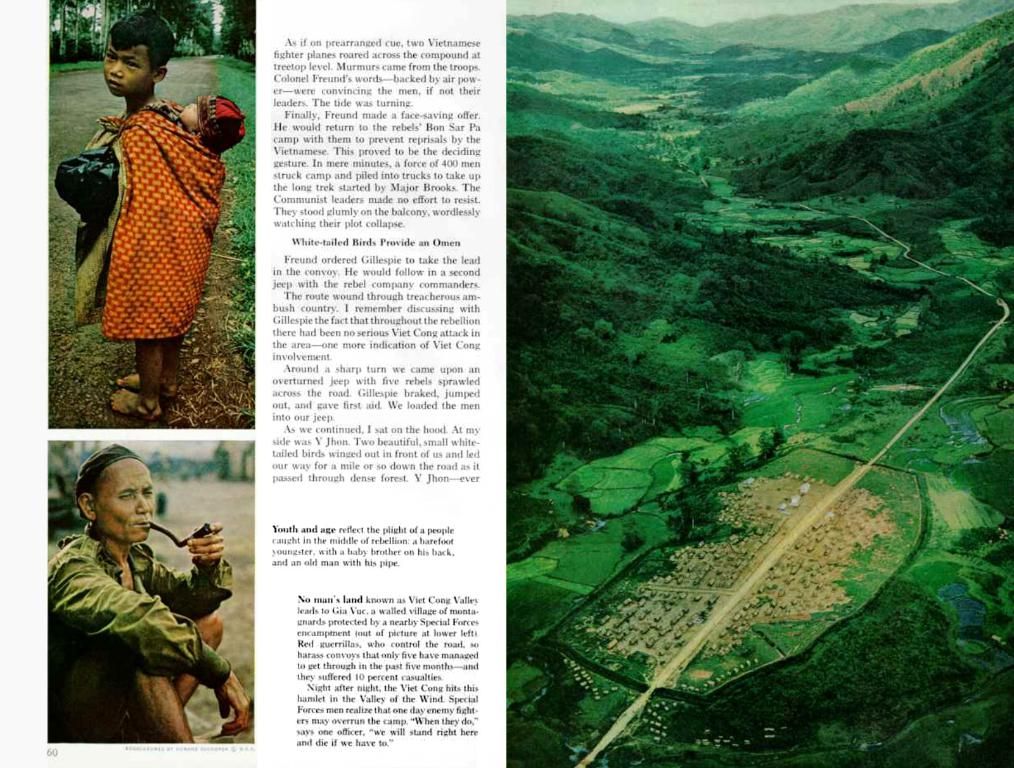Melodies of Memories: Tunes That Narrate a Community's History
Music has always been a powerful and versatile vehicle for expressing human emotions, documenting history, and preserving cultural heritage. This powerful vessel carries tales of love, sorrow, victory, and the hardships faced by individuals and communities throughout history. Music links people, transcends borders, and breathes life into stories that would otherwise remain untold.
From the rhythmic beats of ancient African drums to the soulful strains of Irish fiddles, each melody and harmony whispers a story waiting to be heard. African drums communicate messages and knit together communities through their unique rhythm, while the Irish fiddle shares stories of joy, sorrow, and the tumultuous history faced by the Irish people. Generations old, these songs serve as a poignant reminder of cultural heritage and a rallying cry for unity.
Genealogical roots twist and weave with the melodies of our ancestors. Music functions as a living archive, with each verse serving as a testament to our lineage. In countless communities, tracing family trees transcends the simple act of naming ancestors and dates; it serves as a means to reclaim the sounds and stories of our past. Spirituals created during times of struggle contain hidden messages and wisdom, guiding future generations in their pursuit of identity and connection.
Modern music evolves with society, weaving together elements of tradition and contemporary influences. The fusion of traditional and modern melodies produces a new dialogue between past and present, creating a dynamic narrative that resonates with its listeners. Hip-hop artists, for instance, use sampling to craft songs that blend past melodies with contemporary lyrics, creating a conversation that catapults music into a relevant and forward-thinking medium.
Music echoes societal changes and mirrors the struggles, conflicts, and revolutions faced by individuals and communities. During the 1960s, music played an essential role in the civil rights movement, giving voice to the voiceless as songs like Bob Dylan's "Blowin' in the Wind" and Sam Cooke's "A Change Is Gonna Come" captured the essence of the struggle for equality. Today, online platforms and cross-cultural collaboration enable music to remain a vital and evolving form of storytelling.
Preserving musical traditions is essential to maintaining cultural identity. In many communities, traditional songs are passed down through generations orally, accompanied by customs that foster collective memory. This is particularly evident in cultures where written languages are not prevalent, and music serves as the primary means of education and record-keeping. The Maori people of New Zealand, for example, use Haka—a traditional war dance accompanied by song—to maintain their cultural heritage and instill pride in their youth.
Festivals and gatherings have long played a role in celebrating and showcasing cultural music traditions. Mardi Gras in New Orleans and Brazil's Carnival draw crowds who crave the infectious rhythms and vibrant sounds that weave together the rich cultural tapestry. Music serves as a bridge that connects attendees to their heritage, creating an atmosphere that fosters a shared sense of identity and belonging.
In conclusion, music is an integral and enduring part of the human experience. Whether it weaves the fabric of culture and history, reflects societal norms and changes, or serves as a vessel for emotional expression, music's significance cannot be underestimated. Through its powerful dance with time and cultures, music speaks the stories that have defined past, present, and future generations.
The musical traditions of our ancestors form a genealogical roots entwined with their melodies, creating an audible family history. In a similar vein, music festivals such as Mardi Gras and Carnival celebrate cultural heritage, strengthening ties among attendees and instilling pride in their shared lineage.
As a living archive, music echoes the tale of each community, singing stories that might otherwise remain unsung. Whether it be traditional African drums, Irish fiddles, or modern hip-hop, music serves as a testament to our heritage, providing the foundation for future generations to build upon.








